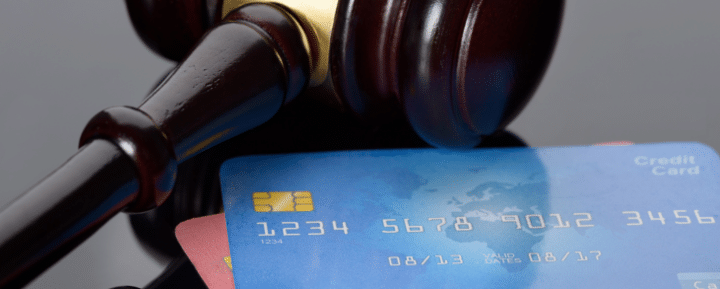Being sued by your credit card company can be a scary and stressful situation. But taking the right steps can ensure you come out relatively unscathed — and maybe even win the case.
Here’s what you should know about navigating a credit card debt lawsuit and setting yourself up for a favorable outcome.
Introduction to Credit Card Lawsuits
A credit card lawsuit is a legal proceeding initiated by a creditor or a debt collector against someone who failed to repay their credit card debt according to the agreed-upon terms.
How a Credit Card Debt Collection Lawsuit is Initiated
The process typically begins when a creditor claims that the debtor has defaulted on their credit card agreement, usually after several missed payments. Here’s how it generally unfolds:
If you’ve fallen behind on your credit card payments, the creditor will likely attempt to collect the debt through phone calls, letters, and messages. If these attempts don’t work, the creditor might pass the debt to a collection agency, which will take over trying to collect the debt.
When the collection attempts continue to be unsuccessful, the original creditor or a debt collector may decide to file a lawsuit to recover the owed money. The creditor (or the collection agency as the plaintiff) files a complaint in a court with jurisdiction over the place where you reside. You’re then served with a summons and a complaint, which outlines the reasons for the lawsuit and the amount of debt claimed by the creditor. The summons informs you about the need to appear in court or respond by a certain date.
You then have the opportunity to respond to the lawsuit, either by appearing or filing a written response disputing the claim, or by providing a counterclaim, if applicable. If you don’t respond, the creditor can request a default judgment from the court.
Steps Involved in a Credit Card Lawsuit
If the case proceeds, both parties engage in the discovery process, exchanging documents and information related to the debt. This may include interrogatories, which are questions that require answers and requests for documents, and even possible depositions.
Before going to trial, there may be motions filed by either party to resolve the case or limit issues (such as summary judgment motions). This stage may also include negotiation attempts to settle the case out of court.
If no settlement is reached, the case goes to trial. Both sides present their evidence and arguments, and a judge or jury makes a decision based on the merits of the case.
If the creditor wins, the court issues a judgment against the debtor for the amount owed plus any additional court and attorney fees and interest as allowed by law.
With a court judgment, the creditor can seek collection through wage garnishment, bank account levies, or liens on property. Keep in mind that you have certain rights even after a judgment, including the right to appeal the decision or file a motion to vacate the judgment under specific circumstances.
Knowing Your Rights
Importance of Being Aware of Your Legal Rights
As a credit card borrower, it’s crucial to know your rights under the law. Understanding your rights can protect you from unfair or deceptive practices by creditors or collection agencies. You’re also better equipped to handle disputes and prevent issues from escalating into more serious conflicts or legal actions.
Common Credit Card User Rights
Credit card users have specific rights when it comes to debt collection, which are primarily protected under the Fair Debt Collection Practices Act (FDCPA). These rights are designed to protect consumers from abusive, deceptive, and unfair debt collection practices.
Here are some of the key rights that credit card users have under the FDCPA:
- Protection Against Harassment: Debt collectors are prohibited from harassing, oppressing, or abusing anyone, including using threats of violence or harm, or obscene or profane language.
- Restrictions on Communication Times: Debt collectors typically can’t contact you before 8 a.m. or after 9 p.m., unless you agree to it. Moreover, they can’t contact you at work if they’re told you’re not allowed to receive calls there.
- Debt Validation Notice: Within five days of first contacting you, the debt collector must send you a written “validation notice” telling you how much money you owe, the name of the creditor to whom you owe the money, and what to do if you believe you don’t owe the money.
- Right to Dispute the Debt: You can dispute all or part of the debt within 30 days of receiving the validation notice, and the collector must obtain verification of the debt. During the time the debt is being disputed, the collector must cease collection efforts.
- Protection Against Unfair Practices: Debt collectors can’t engage in unfair practices when they try to collect a debt. For example, they can’t collect any amount greater than your debt (unless allowed by law), deposit a post-dated check prematurely, or take or threaten to take your property unless it can be done legally.
- No Misrepresentation: Debt collectors can’t lie when they are trying to collect a debt. For example, they can’t claim to be attorneys or government representatives, claim that you have committed a crime, falsely represent that they operate or work for a credit reporting company, or misrepresent the amount you owe.
How to Respond to a Summons
Responding to a summons for a credit card debt lawsuit is critical. If you don’t respond by the deadline, the court may grant a default judgment in favor of the plaintiff (the creditor or debt collector). This means the court has decided the case against you without hearing your side, based on the evidence presented by the creditor alone. A default judgment typically allows the creditor to begin collection efforts, which could include wage garnishment, bank account levies, or liens on your property.
Read the Summons and Complaint Carefully
Review the details to understand exactly what you are being accused of, including the amount of debt claimed. There will be a specified period (usually 20 to 30 days, depending on your jurisdiction) by which you must respond to the summons. Failing to respond within this timeframe can result in a default judgment against you.
Verify the Debt
Before you are sued and when you receive the first notice from the collector, you have the right to verify the debt. You can request the collector provide proof of the debt, such as the original contract, a statement showing the balance owed, and evidence that the collection agency has the right to sue you.
Consider Legal Counsel
It’s advisable to consult with an expert in debt resolution law like a debt relief attorney who specializes in debt collection defense. A debt help attorney can provide guidance based on local collection laws and the specifics of your debt lawsuit matter.
Prepare Your Response
Respond to each point made in the complaint filed against you by the creditor. You can admit, deny, or state that you do not have enough information to admit or deny the claims. Denying a claim requires the creditor to provide more proof. You can also raise any legal defenses you may have, such as the statute of limitations being expired or the amount being incorrect. If applicable, file counterclaims if the creditor has violated any laws in their dealings with you.
File Your Answer
File your answer with the court clerk within the deadline and ensure that you follow all local court rules for submitting documents. You must also serve a copy of your response to the plaintiff’s attorney or the plaintiff if there is no attorney. This is typically done by mail, but to be sure it’s done right, you should consider speaking with a debt solutions attorney who specializes in credit card debt lawsuits. If done wrong, your answer could be thrown out.
Keep Records
Keep copies of all documents and correspondence related to the case, including your response and any receipts for mailed documents.
Legal Defense Strategies
When facing a credit card lawsuit, there are several common defenses that might be employed, depending on the specifics of the case:
- Statute of Limitations: Each state sets a limit on how long a creditor has to sue over a debt. If the lawsuit is filed after this period, the defendant can argue that the creditor has forfeited the right to sue.
- Lack of Standing: This defense challenges whether the plaintiff has the right to sue you. In many credit card cases, the original creditor sells the debt to a third party or collection agency, which then files the lawsuit. You can demand proof that they own the debt and have the legal standing to sue.
- Incorrect Debt Amount: It’s possible that the amount of debt claimed is inaccurate. This could be due to incorrect interest, fees, or payments that weren’t credited. Requesting a detailed accounting of how the debt amount was calculated can be a part of your defense.
- Fraudulent Charges: If the credit card debt includes charges that you didn’t authorize or were fraudulently made on your account, you can contest these amounts. Credit card companies are required to comply with specific procedures for handling disputes regarding unauthorized charges.
- Unfair Debt Collection Practices: If the creditor or collector used illegal debt collection practices, this might not directly negate the debt but could give you leverage in negotiations or lead to separate legal remedies.
- Bankruptcy Discharge: If the debt was part of a bankruptcy filing and was discharged in the bankruptcy, this eliminates the obligation to pay the debt. Providing proof of the discharge can effectively nullify the lawsuit.
- Errors in the Lawsuit Documents: Sometimes, a defense can be based on procedural mistakes in how the lawsuit was filed, such as errors in how you were served with the lawsuit papers.
Getting Legal Help
If you’re facing a credit card debt lawsuit, hiring an attorney can be a crucial step in protecting your rights and achieving the best possible outcome. Here’s when to consider hiring an attorney and how to go about it:
When to Hire an Attorney
Ideally, you should hire a debt relief attorney as soon as you are served with a lawsuit. The timelines for responding to a lawsuit are typically short (often 20-30 days), and missing the deadline can lead to a default judgment against you.
Additionally, if the debt amount is substantial or if there are complex legal issues involved (like claims of fraud or identity theft), it’s particularly important to have legal assistance. An attorney can help negotiate with the creditor or collector possibly to reduce the debt or set up a payment plan.
Choosing the Right Lawyer for Your Case
Choosing the right attorney who understands credit card debt legal issues and whom you feel comfortable working with is key. Here are a few steps you can follow to find the right professional:
- Research Qualified Attorneys: Look for experienced attorneys who specialize in consumer debt and credit law. They will have the most relevant experience and knowledge to handle your case. You can contact your local or state bar association for a referral list of attorneys in your area who specialize in debt-related cases. If you have low income, you may qualify for assistance from a legal aid society. Some legal aid organizations offer free or reduced-fee services to those who qualify.
- Evaluate Credentials and Experience: Websites like Avvo, Martindale-Hubbell, and others can provide lawyer ratings, client reviews, and details about a lawyer’s experience and specialties. Most attorneys also offer a free initial consultation, so you can use this opportunity to ask about their experience with credit card lawsuits, their approach to defense, and their understanding of your particular situation.
- Discuss Fees and Costs: Be sure you understand how the debt collection attorney charges before hiring them. Some work on a contingency basis, others charge by the hour or offer a flat rate for handling debt lawsuits. Ensure the cost of the attorney is proportionate to the debt involved and the complexity of your case.
- Make Your Decision: Choose an attorney you feel comfortable working with, who understands your concerns, and communicates clearly on your debt collection matter. Also, ensure all agreements regarding fees, services, and representation are clearly laid out in writing.
Negotiating with Credit Card Companies
Pros and Cons of Settling Out of Court
Settling credit card debt outside of court can be a viable option for many people facing debt lawsuits or overwhelming credit balances. Here are some of the key pros and cons of choosing this route:
Pros:
- Reduced debt amount: One of the biggest advantages of settling your debt is that you can often negotiate to pay less than the full amount owed. Creditors may agree to accept a lower amount as a full settlement to close the account more quickly.
- Avoid legal proceedings: Settling debt can avoid the time, expense, and stress associated with court proceedings.
- Avoid public court records: A debt settlement keeps the debt resolution process more private, as opposed to a court case that might become a matter of public record.
- Prevent further collection activity: Once settled, the creditor agrees to stop further collection activities, including harassing phone calls and letters.
Cons:
- Impact on credit score: Settling a debt for less than what you originally owed can still negatively impact your credit score. It typically shows up on your credit report as “settled,” which is less favorable than “paid in full.”
- Upfront cash requirement: Some settlements require a lump sum payment, which can be challenging if your financial resources are limited. Not everyone has the immediate funds to make a settlement offer.
- Tax implications: Forgiven debt from a settlement can be taxable. The IRS considers any forgiven debt over $600 as taxable income, and you may receive a 1099-C form which you must report when filing taxes. This isn’t always the case, however, which is why an experienced debt attorney should be involved.
- No legal recourse: Once a debt is settled, if later disputes arise over the terms or if the creditor fails to adhere to the agreement (like failing to report the settlement accurately to credit bureaus), having foregone the court process might limit your options for recourse.
Effective Strategies for Negotiating a Settlement
Settling credit card debt out of court involves negotiation with your creditor or their debt collection agency. It’s a process that can significantly reduce the amount you owe and help you avoid the consequences of a legal judgment. Here are some effective strategies for settling credit card debt:
- Assess your financial situation: Evaluate your debts, income, and expenses to determine what you can afford to pay.
- Know what to offer: Consider both lump sum settlements and payment plans, starting with lower offers to allow room for negotiation.
- Initiate contact proactively: Reach out to the creditor or collection agency to express willingness to settle, ideally, before they initiate legal actions.
- Prepare to negotiate: Use personal hardships as leverage and always start negotiations lower than your maximum payment ability.
- Get everything in writing: Ensure any agreement on debt settlement is confirmed in writing, stating that the payment fulfills the debt obligation.
- Consider professional help: It’s strongly advised that you hire a debt help lawyer, especially if negotiations are complex or you’re uncomfortable handling them yourself.
Understanding the Outcome
The possible outcomes of a credit card lawsuit can vary depending on the specific circumstances of the case and the strategies used by you and your lawyer. Here are some potential outcomes:
Judgment for the Plaintiff (Creditor)
The court may rule in favor of the creditor, ordering the defendant to pay the full amount of the debt claimed, plus any additional legal fees and interest. In some cases, the court might award a lesser amount than what was claimed if there is evidence that part of the debt is incorrect or disputes some charges.
Judgment for the Defendant
The court may dismiss the case if you’re able to successfully prove a defense, such as the statute of limitations has expired, lack of standing by the plaintiff to sue, or full payment of the debt.
If you filed a counterclaim alleging violations such as harassment or breach of contract, the court could rule in your favor and possibly award damages.
Default Judgment
If you failed to respond to the lawsuit within the stipulated time, the court may issue a default judgment against you, typically granting the creditor what they asked for in the complaint.
Appeal
Either party can file an appeal against the trial’s outcome if they believe there has been a legal error or misinterpretation by the judge.
What to Do After a Judgment Is Issued
If a judgment has been issued against you in a credit card debt lawsuit, there are several steps you should consider to manage the situation.
If you’re able to pay, arranging payment promptly is advisable. Alternatively, you might still negotiate a settlement for a lump sum that could be less than the full amount of the judgment.
Considering an appeal is also a viable option if there were errors in the trial process, but be mindful of the strict deadlines for filing an appeal. You should also look into state laws regarding exemptions that might protect certain assets from seizure and file the necessary paperwork to claim these exemptions. If the judgment involves wage garnishment or bank levies, understanding the legal limits and communicating with your employer or bank is crucial. Additionally, property liens might be placed as a result of the judgment, so understanding and managing these is important.
How Tayne Law Can Help
It’s in your best interest to act quickly when being sued for unpaid credit card debt. Debt settlement may still be on the table, but you’ll need the help of an experienced debt attorney.
Tayne Law Group has been assisting borrowers with debt management and resolutions for over 20 years with debt including credit card debt, student loans, merchant cash advance, and others. We offer a free phone consultation with one of our experienced debt relief attorneys. They can go through your options and explain the process. Then you can decide if hiring an attorney is right for you. When you’re ready, call our law firm toll-free at (866) 890-7337 or fill out our short contact form. We never share your information and all discussions are always confidential.





